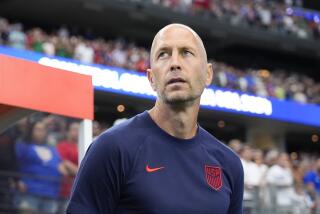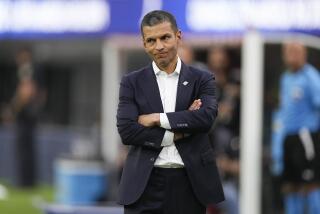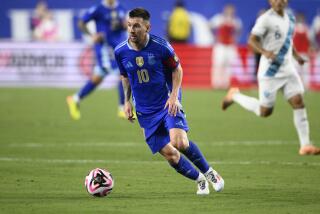WORLD CUP ’90 : It’s Now or Never for Maradona Today : Soccer: Billed as the world’s best player, he must prove himself if Argentina is to stay alive in tournament.
TURIN, Italy — The wheel has almost come full circle for Diego Armando Maradona.
Today, he must either silence the critics by proving that he still is the world’s top player or forever relinquish that claim.
The second round of the World Cup has produced two dramatic pairings: Brazil against Argentina in Turin today, followed by West Germany against the Netherlands in Milan. Between them, the four teams have won the World Cup seven times and finished second six times.
Tomorrow, two of them head home.
In the opinion of many, Maradona and his Argentine teammates will be looking for a flight to Buenos Aires come Monday morning. Based on the teams’ comparative performances to date, Brazil must be considered an overwhelming favorite.
This has been a dismal tournament for the defending world champions, and especially for the player whom many regard as the world’s finest. The team was stunned by Cameroon in the World Cup opener, recovered to defeat the Soviet Union, then was held to a tie by Romania and barely squeaked into the second round with a third-place finish in its group.
For Maradona, the nightmare has been even worse. Not only has he played poorly, but, as in Mexico four years ago, he once again has been accused of cheating.
One headline last Friday in “The European,” a new weekly newspaper, said what many believed to be true: “Magical Maradona Loses His Power.”
Indeed, it does seem as if “the little man,” to use the term preferred by the British media, has lost much in stature, not to mention reputation. Four years ago, the 5-foot-6, 140-pound Maradona was on top of the world, having achieved his lifelong ambition by captaining Argentina to a World Cup triumph.
Today he must either recapture the brilliance of old or recognize that time has caught up with him. At 29, he already has said that this is his last World Cup, that he will not compete in the United States in 1994.
But facing him in Turin’s superb new stadium will be a nemesis: Brazil, the defending South American champion. It is a particularly daunting prospect for Argentina.
In Spain in 1982, Argentina also had a crucial game in the second round. That was Maradona’s first World Cup and it ended with him walking off the field in disgrace. Ejected from the match in Barcelona for committing a vicious foul, he seemed to many to be more prima donna than Maradona.
Argentina’s opponent that day was Brazil.
Today, the teams meet again.
What sort of person is it who knowingly breaks the rules of a sport, gets away with it and then boasts of the fact?
In Mexico City’s Aztec Stadium four years ago, Maradona and Peter Shilton, England’s goalkeeper, came face-to-face in an encounter that immediately became part of soccer lore.
The occasion was the quarterfinals of the World Cup. Early in the second half of the scoreless match, both players leaped to reach a high ball in the penalty area. Shilton tried--legally--to punch it clear. Maradona tried--illegally--to punch it into the net.
Maradona succeeded and immediately raced toward the sideline celebrating his “goal.” The linesmen and referee failed to see the infraction and let the goal stand despite protests by the English players. Argentina ended up winning, 2-1, and went on to win the World Cup.
Replays clearly showed that Maradona had punched the ball into the net with his left fist, not with his head. But all Maradona would say at the time was that it was “the hand of God.”
The quote became famous, but also did something else: It reduced respect for Maradona among many fans around the world and, worse yet, it encouraged other players to cheat in similar fashion. After all, if it was good enough for Maradona . . .
The 1990 World Cup was not supposed to produce any such incident. Referees had been forewarned by FIFA, soccer’s world governing body, to be on the lookout for acts of deception.
It was all the more astonishing, therefore, to see Maradona once again flaunt the rules of the sport. This time, he did so in what for the past five years has been his home stadium, San Paolo in Naples. He is regarded there as almost as a demigod by fans of Napoli, which he twice has led to the Italian League championship.
Argentina was playing the Soviet Union in a game both teams had to win in order to maintain a realistic chance of advancing to the next round. The match was scoreless, but Nery Pumpido, the Argentine goalkeeper, had been carried off the field after suffering a broken leg in a clash with one of his own defenders.
A header by the Soviet Union’s Vladimir Kuznetsov flew in from the left. Maradona, standing inside the penalty area and in front of the net, raised his right arm. Cameras clicked and there on the front page of the next day’s copies of La Gazzetta dello Sport and Corriere Della Sera was Maradona once again illegally handling the ball.
“When I saw the ball coming, my first reaction was to put my arm up,” Maradona said afterward. “I didn’t know if it would have been a goal and I was still upset about Pumpido.
“Referees are like us, they make mistakes.”
Once again, as in 1986, the match officials failed to see the infraction. Had they done so, the Soviets would have been awarded a penalty kick and it might be them, not the Argentines, who today would be playing in the second round.
The latest hand ball prompted loud grumblings not only from Soviet Coach Valery Lobanovsky but also from the media.
A cartoon the next day in London’s Daily Mail showed a referee seated in front of an eye chart upon which letters of various sizes have been replaced by hands of varying size. “He’s refereeing the next Argentina match,” read the caption.
“Diego Maradona would have made a splendid basketball player had he grown two feet taller,” Jeff Powell wrote in the same newspaper.
Michael Calvin, writing in the “Daily Telegraph,” called Maradona’s action “an affront,” and said that his was “the unacceptable face of this World Cup.”
“He showed not the slightest bit of guilt that, once again, he had chipped away at sport’s fundamental values,” Calvin wrote.
A few days later, the Italian sports weekly Guerin Sportivo carried a color picture of the incident on its cover and referred to “the latest Maradona scandal.”
But Maradona once again escaped punishment.
The problem, of course, is that Maradona is, in the truest sense of the word, a soccer-playing genius. When he is on his game, he is untouchable, the best player in the world. Just consider this description of one of Napoli’s league matches against Juventus of Turin, a game in which Maradona scored twice:
The playing surface, the writer said, was “a field of miracles . . . a coffer that is sometimes opened and Maradona all of a sudden takes out diamonds, rubies, sapphires, emeralds and topaz. With simple gestures and a marvelous movement of muscles, he has revived the enchantment. These two goals were the result of magic. Yesterday, the stadium was a crystal castle, people with fairy tale characters . . . (Maradona) left the field carrying his boots, like a violinist with his Stradivarius.”
Such flowery praise aside, there is little that Maradona has not achieved in the four years since winning the World Cup with Argentina in 1986. Nor is there a controversy he has avoided. Maradona’s life, in fact, has been an ongoing soap opera, filled with one extraordinary incident after another.
For example, in the last four years, Maradona has:
--Won two Italian League championships and one European title with Napoli despite a stormy relationship with the club that saw him report a month late for the start of the past season.
--Been the subject of an intense and bitter transfer debate when Olympic Marseilles of France tried to buy him from Napoli, which has him under contract until 1993.
--Been accused of hitting a 15-year-old schoolboy who had followed him home. The charge was denied by Maradona and no more was heard of it.
--Been threatened with a paternity suit, with the same outcome.
--Married his long-time girlfriend, Claudia Villafane, in a $1-million ceremony attended by Argentina’s President, Carlos Menem. Maradona chartered a 747 to fly his Napoli teammates and officials to the Buenos Aires bash last November.
--Has been accused of consorting with leading figures in the Naples Mafia, the notorious Camorra, which derives much of its income from soccer betting. Maradona attended a wedding reception of one Camorra figure and, when asked about it, said: “I am an adult and I go where I want to. As I saw it, they were just a group of Napoli supporters. I didn’t ask to see their calling cards.”
--Involved himself in the Olympic eligibility question by asking why, since Stefan Edberg could play in the Seoul Olympics, he couldn’t play in the Barcelona Games of 1992. Soccer Olympic rules state only players under 23 may participate.
--Alleged that the World Cup draw was fixed to give Italy an easy group and Argentina a difficult one. This led to FIFA General Secretary Joseph Blatter calling Maradona “stupid and malicious” and threatening to ban him from the World Cup unless he recanted. In the end, Maradona paid a wrist-slap fine and all was forgotten.
--Been voted athlete of the decade by the British sports media, beating out the likes of Carl Lewis, Edwin Moses and Seve Ballesteros.
--Embroiled himself in a war of words with FIFA President Joao Havelange over how little of the World Cup’s vast profits filtered down to the players taking part in the tournament. Considering the salary and benefits of players such as Maradona, Havelange was not amused.
“If he (Maradona) isn’t happy, he doesn’t have to come (to the tournament),” Havelange said. “When Maradona arrived in Mexico, he was a normal person. Afterward, he was a star. So he has gained from playing in the World Cup.”
But not from this one. So far, Maradona has contributed not even so much as a true shot on goal, although the value of his hand ball “save” against the Soviets is incalculable.
Physically, he might have reached his limits. And the Argentine team itself is a pale shadow of four years ago.
Even Maradona realized after the loss to Cameroon--and probably long before that--that Argentina is not the same team it was in 1986.
“The reality is different and we should not hide the fact,” he said. “The reality is that we are not at the same level as Italy, Brazil and West Germany.”
But there are still those who wonder. Is Maradona really through or has he been biding his time? Can he once again conjure up the magic of Mexico?
Before the World Cup, former English Coach Ron Greenwood gave his opinion of the Argentine star. As matters turned out, it proved prophetic.
“He is extravagantly gifted and able to do everything at pace,” Greenwood said. “He has almost animal reflexes and awareness. He’s one of the game’s small and sadly diminishing band of genuine match winners.”
And that is exactly what concerns Brazil today. Maradona proved what he is capable of doing in Mexico. He has yet to do so in Italy, and today’s match might be his last chance.






